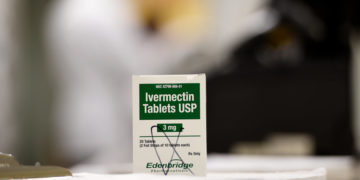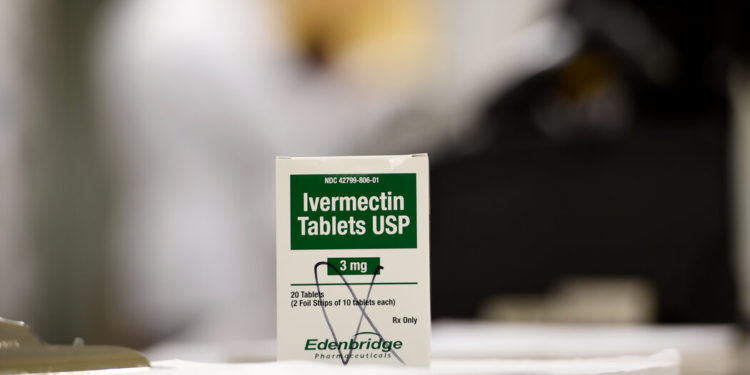Joe Grinsteiner is a gregarious online personality who touts the anti-parasitic drug ivermectin. In a recent Facebook video, he produced a tube of veterinary-grade ivermectin paste — the kind made for deworming horses.
He gave the tube a squeeze. Then he licked a slug of the stuff, and gulped.
“Yum,” Mr. Grinsteiner said in the Feb. 25 video, one of a number of ivermectin-related posts he has made that have drawn millions of views on Facebook this year. “Actually, that tastes like dead cancer.”
Ivermectin, a drug proven to treat certain parasitic diseases, exploded in popularity during the pandemic amid false claims that it could treat or prevent Covid-19. Now — despite a persistent message from federal health officials that its medical benefits are limited — interest in ivermectin is rising again, particularly among American conservatives who are seeing it promoted by right-wing influencers.
Mr. Grinsteiner, 54, is a Trump supporter and country music performer who lives in rural Michigan. He has claimed in his videos that ivermectin cured his skin cancer, as well as his wife’s cervical cancer. In a video last month, he said a woman told him her nonverbal autistic child had become verbal after using ivermectin. In a recent phone interview, Mr. Grinsteiner said that he takes a daily dose of ivermectin to maintain his general well-being.
There is no evidence to support people taking ivermectin to treat cancer or autism. Yet Mr. Grinsteiner believes that the medical and political establishments just want to keep average people from discovering the healing powers of a relatively affordable drug.
“These guys are absolutely money driven,” he said in one video. “And when I say ‘these guys,’ I’m talking about all those politicians in Washington taking money from the big pharma.”
Indeed, ivermectin has become a sort of enduring pharmacological MAGA hat: a symbol of resistance to what some in the movement describe as an elitist and corrupt cabal of politicians, scientists and medical experts. While many of those experts fear that misinformation about ivermectin could lead to overdoses — or prompt people to reject proven treatments for Covid or other ailments — conservative lawmakers in a number of states are promoting legislation that would allow ivermectin to be sold without a prescription, often in the name of medical freedom.
Last week, Gov. Sarah Huckabee Sanders of Arkansas signed
a law allowing ivermectin to be sold over the counter . Other legislation is pending in at least six other states: Kentucky, West Virginia, Louisiana, Georgia, Alabama and Texas. In 2022, Tennessee passed a law making it easier to get ivermectin from a pharmacist.
President Trump’s new health secretary, Robert F. Kennedy Jr., has in the past embraced the idea that ivermectin can treat Covid, but whether he might seek to integrate the drug into his “Make America Healthy Again” agenda remains unclear. Mr. Kennedy did not respond to a request for an interview for this article.
But in 2021, he filed a petition with the Food and Drug Administration asking officials to de-authorize the Covid vaccine, arguing that ivermectin was safer.
The Food and Drug Administration continues to emphasize that it has not authorized or approved ivermectin for treating Covid, noting on its website that “currently available clinical trial data do not demonstrate that ivermectin is effective against Covid-19 in humans.”Dr. Robert Califf, who led the F.D.A. during the Obama and Biden administrations, said he was concerned about people choosing ivermectin over proven treatments, like vaccination for Covid or chemotherapy for cancer. He said he was also concerned about overdoses, particularly in people taking the veterinary form of the drug. In high doses, ivermectin can be toxic and cause central nervous system problems like blurred vision, confusion and seizures. The F.D.A. has also warned that high doses can lead to coma or death.
Right-wing media, however, is full of advertisements for the drug; some ads describe it as an essential component of survivalist tool kits. The website Gateway Pundit recently ran a sponsored post from an online company that offers prescription ivermectin for “stockpiling” purposes, with an illustration of a postapocalyptic street scene.
Two major figures in the MAGA movement — former Representative Matt Gaetz of Florida and Dan Bongino, the deputy director of the F.B.I., have promoted All Family Pharmacy, an online outfit that dispenses ivermectin with “a prescription from our licensed doctors.”
“No more fighting the system for the treatments you want,” Mr. Bongino said on an episode of his popular podcast, one of his last before starting at the F.B.I. “Stock up now before the next crisis hits.”
The ongoing interest in ivermectin comes as little surprise to Lewis A. Grossman, a law professor and historian at American University who has written extensively about the concept of “therapeutic choice.” Mr. Grossman said that over the course of American history, a number of treatments have become popular despite having little or no buy-in from medical experts.
For example, he said, laetrile, an unproven cancer remedy derived from apricot pits, surged in popularity in the 1970s; the actor Steve McQueen used it in his unsuccessful fight against cancer.
At the height of laetrile’s popularity, proponents praised its affordability and railed against a big medicine-government “conspiracy” against it, while many experts classified it as quackery. The F.D.A. never approved it for treating cancer or any other therapeutic use, said Mr. Grossman, who is writing a book about laetrile called “Seeds of Rebellion.”
“The ivermectin story fits within a very, very long tradition in America of people latching on to nonorthodox therapies based in part on their suspicion that, for profit-maximizing reasons, drug companies and physicians are suppressing truth about them,” Mr. Grossman said.
Mr. Grinsteiner said that he was familiar with ivermectin because he runs a small farm and uses it on some of his livestock. Suspicious of the Covid vaccine, he decided to take ivermectin preventively during the pandemic instead. His wife did so as well.
She got pregnant six months after she started taking ivermectin regularly. They went to the doctor, Mr. Grinsteiner said, and found out that her previously diagnosed cervical cancer had cleared up. He also said that he rubbed ivermectin on a cancerous spot on his nose. He added that the spot cleared up and that a doctor later told him the cancer was gone.
He made his first Facebook video about his experience with ivermectin in January. “It was like, maybe a minute video, and I went to bed,” he said. “And I woke up and my phone was just melting.”
Facebook briefly suspended his account, then reinstated it. The company has appended to some of his videos links to a “context” page from the fact-checking group Science Feedback.
The page notes that ivermectin and another anti-parasitic drug, mebendazole, have shown “promising anticancer effects in in vitro and animal studies. However, preclinical studies cannot reliably predict a drug’s effectiveness against cancer in humans, and drug candidates that show effectiveness in cells and animals often fail in clinical trials.”
Still, Mr. Grinsteiner has been frustrated with Facebook and has started a stand-alone website that he often mentions in his Facebook posts. On the site, Mr. Grinsteiner says he does not give advice on “what to take and (or) how to take it.” Rather, he said, it is a place for people to compare notes.
Thus far, visitors to the site have discussed ivermectin as a potential treatment for neuropathy, renal failure, lupus and other maladies. Mr. Grinsteiner sells a T-shirt for $15.68 that declares, “I wish ivermectin worked on the parasites in D.C.!”
A number of the lawmakers pushing to make ivermectin easier to buy in their states say they want to help constituents who are already taking it, some of whom use veterinary-grade ivermectin because they cannot get it at a regular drugstore.
“Constituents brought it to me; it wasn’t something I thought up on my own,” said State Senator Alan Clark of Arkansas, the Republican who sponsored the new law there.
“Mostly they’re going to the ag store” for ivermectin, Mr. Clark said. “And it would be much safer for them to use what is intended for human consumption.”
Professor Grossman said that it has long been assumed that states do not have the authority under federal law to make a prescription drug available over the counter.
Many lawmakers seeking to ease access to ivermectin, like State Representative Wes Virdell of Texas, say they are promoting what Mr. Virdell, a Republican, calls “medical freedom.”
“I think people should be able to choose whatever route they want” to treat themselves, he said. “Even if they’re wrong, right?”
Dr. Califf, the former F.D.A. commissioner, sees it differently.
“All interventions have risks,” he said. “And if you have no benefit, and you have some risk, then why on earth — you know, there’s no rational reason why someone should take the intervention.”
Dani Blum contributed reporting.
Richard Fausset, based in Atlanta, writes about the American South, focusing on politics, culture, race, poverty and criminal justice. More about Richard Fausset
The post Why the Right Still Embraces Ivermectin appeared first on New York Times.



















